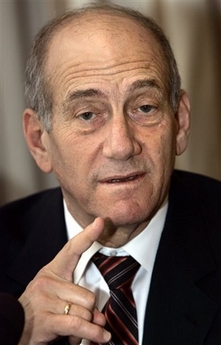JERUSALEM - Israel's prime minister delivered his strongest comments yet on
Iran's nuclear program, warning Thursday that Tehran would have "a price to pay"
if it does not back down from its atomic ambitions and hinting that Israel might
be forced to take action.

Israeli Prime Minister Ehud Olmert
gestures during a meeting with the families of soldiers serving in the
Israeli armed forces, Moscow, Thursday, Oct. 19, 2006. Although ties
between Russia and Israel have warmed dramatically since the Soviet Union
collapsed, the two countries are in deep disagreement over how to confront
the Iranian nuclear threat. After meeting with Russian President Vladimir
Putin on Wednesday Olmert said Iran cannot be prevented from gaining
nuclear arms if it is not afraid of retribution.
[AP] |
Ehud Olmert did not specifically threaten to cripple Iran's nuclear program
in a military strike, as it did 25 years ago in Iraq when it bombed an
unfinished nuclear reactor there. But he repeated what he said a day earlier
after meeting Russian President Vladimir Putin in Moscow - the Iranians "have to
be afraid" of the consequences of their intransigence.
"They have to understand that if they object to every compromise, there will
be a price to pay," Olmert said on a flight back to Israel after a three-day
trip to Moscow.
Israel rejects Tehran's claim that its nuclear program is peaceful, designed
solely to produce energy. In the past, Israel has said it would not lead a
campaign against Iran's nuclear program, but would act in concert with world
powers that are similarly worried.
But with Iran rejecting various compromise proposals and insisting on
enriching uranium - a process key to developing nuclear weapons - Olmert been
raising the stakes. He said Israel cannot reconcile itself to a nuclear Iran.
"There comes a time when you have to do damage control," he said. "A red line
must be drawn that cannot be crossed," Olmert added, without elaborating. "Time
isn't standing still," he said "and perhaps there will be a need to do something
in the future."
Some Israeli officials have made specific threats to hit Iran. But military
experts have questioned Israel's ability to destroy Iran's nuclear facilities,
which unlike Iraq's in 1981 are scattered among installations, some hidden
underground. But they have said Israel could set the program back years by
striking several of the sites.
Israel considers Iran to be the greatest threat to its survival. Iranian
President Mahmoud Ahmadinejad has repeatedly called for the Jewish state's
destruction, and Iran already has missiles capable of carrying payloads to
Israel.
Ahmadinejad shrugged off the threat of U.N. sanctions Thursday, saying his
nation would not give up any of its nuclear program.
"The Iranian nation will not cede one iota of its rights," Ahmadinejad told
thousands of cheering supporters in the town of Islamshahr, about 25 miles south
of the capital Tehran.
"Our nation achieved proficiency in nuclear energy at a time when you imposed
economic, scientific and technological sanctions against us," he said,
addressing the U.S. and its allies and referring to sanctions imposed on Iran
after the 1979 Islamic revolution and hostage-taking at the U.S. Embassy in
Tehran.
The crowd interrupted his speech with the chant: "Nuclear energy is our
right!"
France said Wednesday that a resolution calling for sanctions against Iran
would likely be circulated at the U.N. Security Council by the end of the week.
Support for sanctions has grown among council members after weeks of talks
between the EU and Iran failed to persuade Tehran to suspend uranium enrichment
and start broader negotiations.
At a meeting in Luxembourg on Tuesday, European Union foreign ministers
endorsed a decision by the U.N.'s five permanent Security Council members ¡ª the
U.S., Russia, China, Britain and France ¡ª and Germany to pursue limited
sanctions on Tehran while keeping the door open to future talks.
Iran has stalled on a package of economic incentives and political rewards
that the six countries offered in June, on the condition that Tehran agree to
consider a long-term moratorium on uranium enrichment.